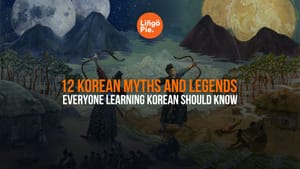Growing up, my dad always joked that grandmothers ran the world from their kitchens. Turns out, he wasn't wrong! These women can command the entire family with nothing but their old recipes, embarrassing stories, and an uncanny ability to know exactly who needs an extra serving of love (and food) at any given moment.
It's no wonder, then, that cultures worldwide have developed such special ways to address these beloved family members. Some families stick with the classic "Grandma," while others use names passed down through generations or borrowed from their cultural heritage.
In this post, we'll explore over 50 different ways people say grandmother in various languages. So stick around because maybe you'll find a new name for the family boss in your life!
- 8 Best Comedy Movies Like Superbad To Watch ASAP
- Popular Fictional Languages Every Cinephile Should Know
- High Valyrian 101: Targaryen Speech for HOTD Fans

Grandmother In Different Languages
Grandmother In Western European Languages
What started as formal terms like French "grand-mère" evolved into the cozier "mamie" and Italian "nonna" that we hear at family gatherings today. Western European grandmother names tend to be short and sweet, perfect for little ones to call across a busy kitchen.
- Spanish: Abuela, Abuelita (affectionate), Yaya (informal)
- French: Grand-mère (formal), Mamie (common), Mémé (casual)
- Italian: Nonna, Nonnina (little grandma)
- Portuguese: Avó, Vovó (Brazil), Vovózinha (affectionate)
- German: Oma (common), Großmutter (formal)
- Dutch: Oma, Grootmoeder (formal)
- Swedish: Mormor (maternal), Farmor (paternal)
- Danish: Bedstemor, Mormor (maternal), Farmor (paternal)
- Irish: Seanmháthair (formal), Mamó (common)
- Welsh: Nain, Mam-gu
- Scottish Gaelic: Seanmhair, Màthair-mhòr
- Norwegian: Bestemor, Mormor, Farmor
- Finnish: Isoäiti, Mummo, Mummi
- Icelandic: Amma, Ömmó
- Luxembourgish: Boma, Groussmamm
- Catalan: Àvia, Iaia
- Galician: Avoa, Avó
- Basque: Amona, Amatxi
- Swiss German: Grosi, Oma
Want to sound like a local? In Spain, "Yaya" is the casual go-to, while Latin Americans might throw in "Lita" or "Tita." French kids rarely use "Grand-mère" – it's all about "Mamie" or the super casual "Mémé."
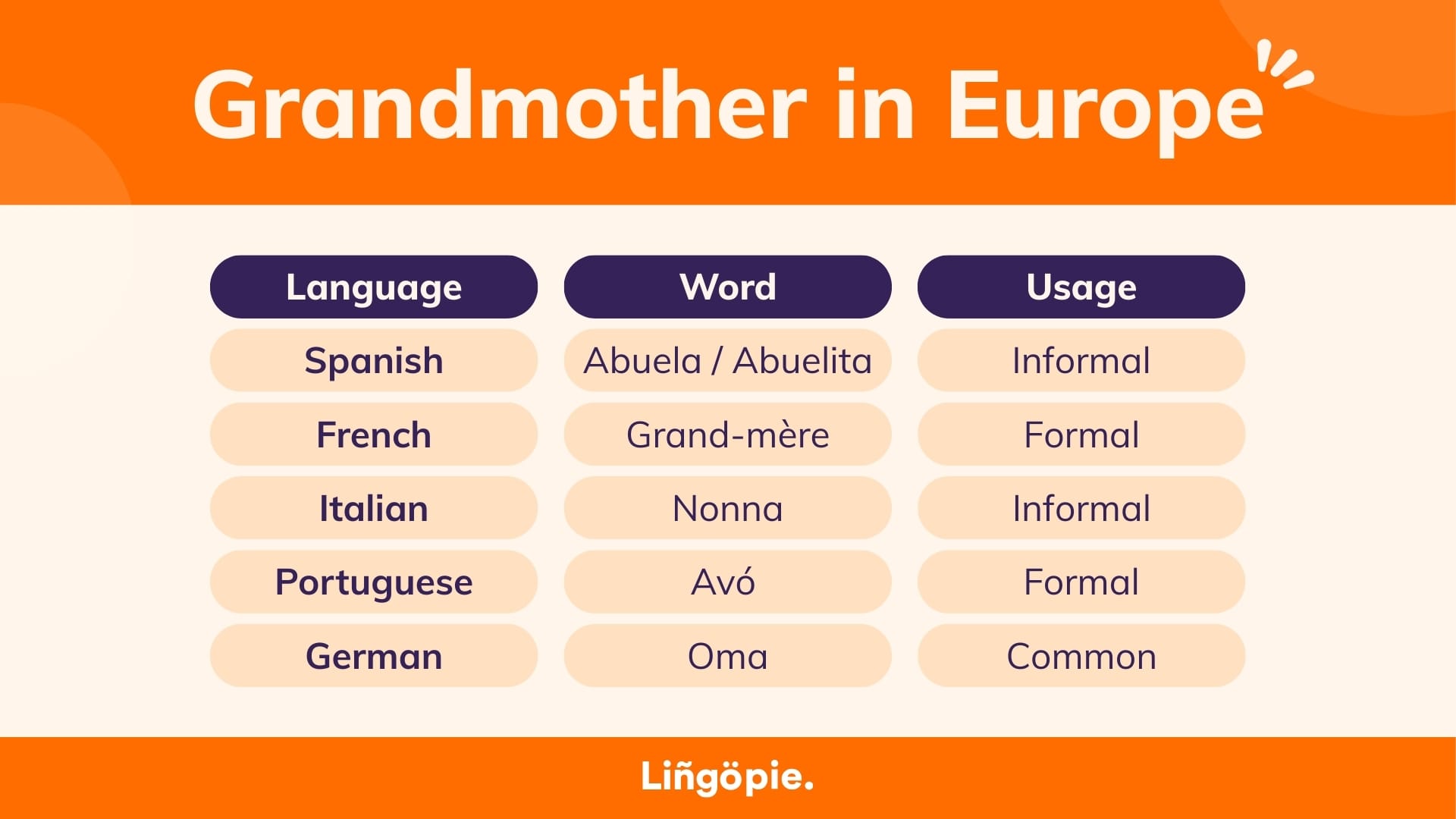

Grandmother In Eastern European Languages
Eastern European grandmothers gave us "babushka" - a term so perfect it spread worldwide. These languages often use variations of "baba" or "babcia," reflecting the close-knit family bonds where grandmothers often live with or near their grandkids.
- Russian: Бабушка (Babushka), Баба (Baba)
- Polish: Babcia, Babula (affectionate)
- Ukrainian: Бабуся (Babusya)
- Czech: Babička
- Serbian: Бака (Baka)
- Croatian: Baka, Bakica (affectionate)
- Lithuanian: Močiutė, Senelė
- Latvian: Vecmāmiņa, Oma
- Bulgarian: Баба (Baba)
- Slovak: Stará mama, Babička
- Slovenian: Babica, Stara mama
- Macedonian: Баба (Baba)
- Romanian: Bunică, Bunica, Mamaie
- Hungarian: Nagymama, Nagyi
- Albanian: Gjyshja, Nëna
- Belarusian: Бабуля (Babulya)
Most locals just say "Baba" – it's shorter and sweeter than the formal versions. Polish grandkids often use "Busha" or "Busia" when calling their grandmas, while Russian families might shorten "Babushka" to "Babulya" for extra affection.
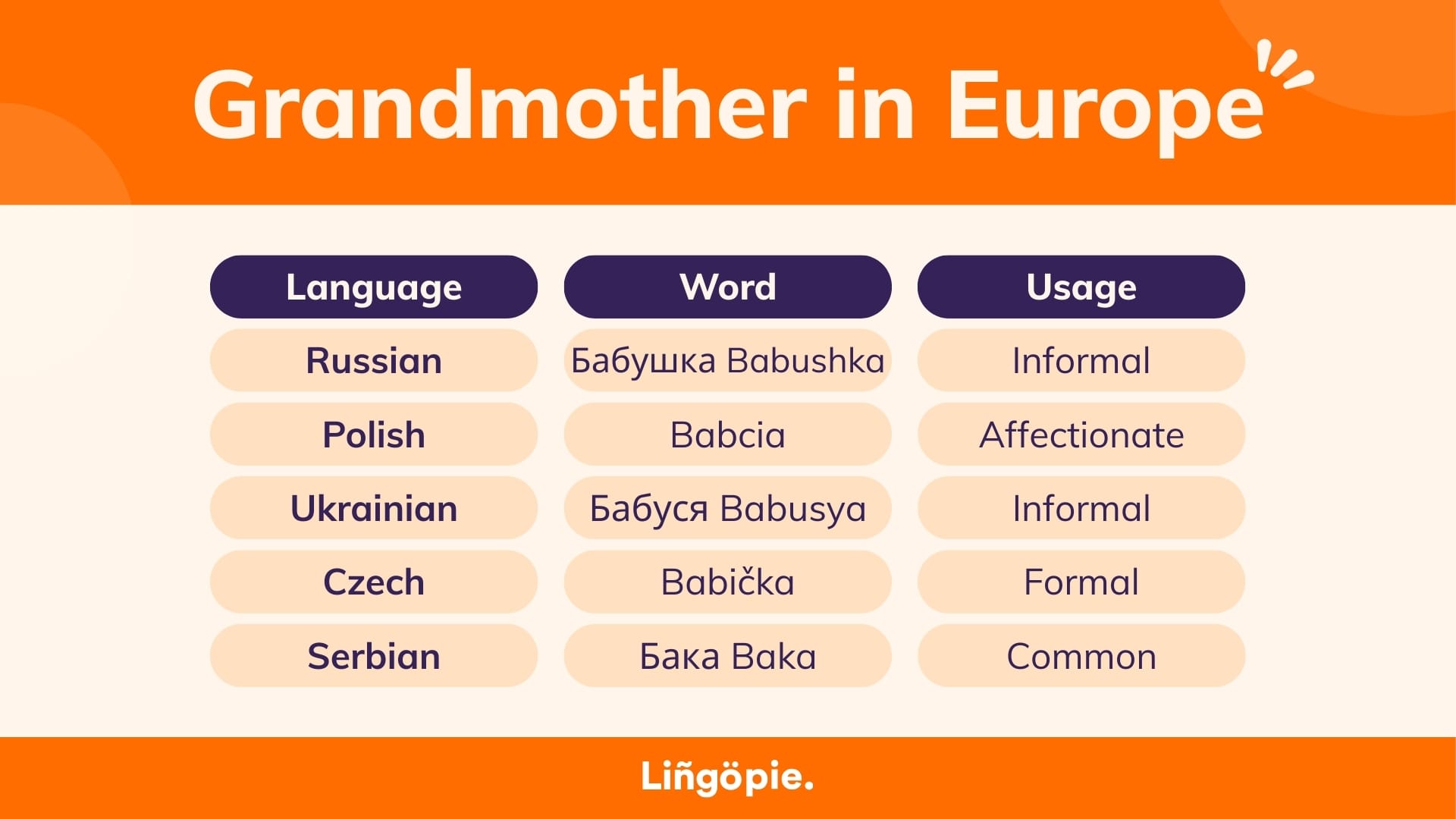
Grandmother In Asian Languages
Most Asian languages use different names for dad's mom versus mom's mom. It's not just about being precise - these distinct terms show respect for both sides of the family tree and reflect each grandmother's unique role in family life.
- Mandarin Chinese: 奶奶 (Nǎinai - paternal), 外婆 (Wàipó - maternal)
- Japanese: お祖母さん (Obaasan), おばあちゃん (Obaachan - casual)
- Korean: 할머니 (Halmeoni), 외할머니 (Oehalmeoni - maternal)
- Vietnamese: Bà Nội (paternal), Bà Ngoại (maternal)
- Thai: ยาย (Yai - paternal), คุณย่า (Khun Ya - maternal)
- Filipino/Tagalog: Lola, La, 'Nay, Inay(Spanish influence)
- Indonesian: Nenek, Oma (Dutch influence)
- Hindi: दादी (Dadi - paternal), नानी (Nani - maternal)
- Bengali: ঠাকুরমা (Thakurma - paternal), দিদা (Dida - maternal)
- Tamil: பாட்டி (Paatti)
- Urdu: دادی (Dadi - paternal), نانی (Nani - maternal)
- Cantonese: 嫲嫲 (Ma Ma), 婆婆 (Po Po)
- Malay: Nenek, Tok
- Mongolian: Эмээ (Emee)
- Nepali: हजुरआमा (Hajur Ama)
- Khmer: យាយ (Yeay)
- Burmese: အဖွား (Hpu-Hpwa)
- Lao: ຍ່າ (Ya)
- Punjabi: ਦਾਦੀ (Dadi), ਨਾਨੀ (Nani)
In China, you'll hear "Nai Nai" way more than any formal terms. Japanese families usually skip the formal "Obaasan" for the cuter "Obachan" or even "Baachan." Korean grandkids often drop the formal "-ni" ending and just say "Halmi."
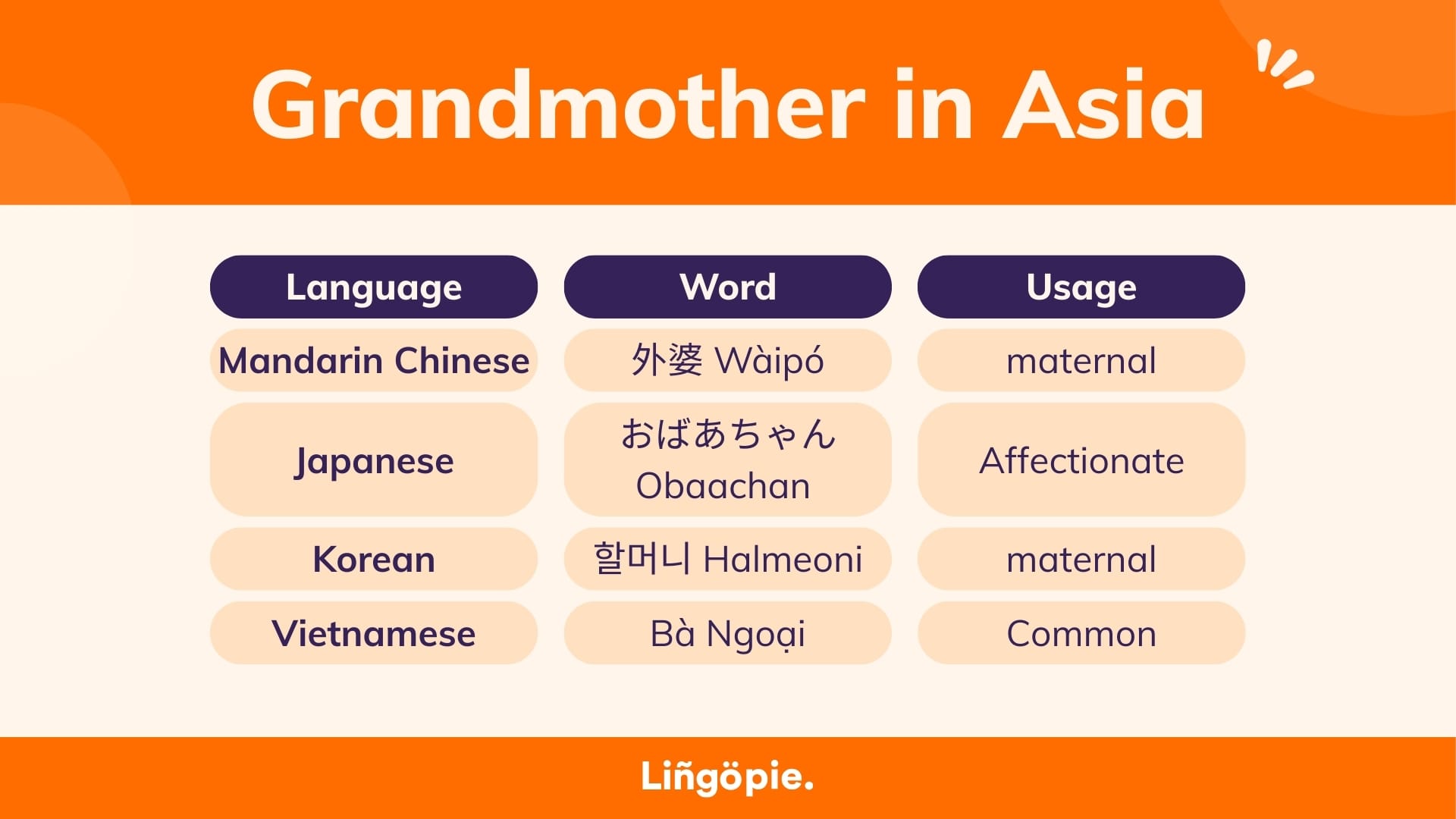

Grandmother In Middle Eastern & North African Languages
In Middle Eastern and North African homes, where three generations often share one roof, grandmother names blend authority with affection. Each region adds its own spin to common terms like "teta" and "jaddah," often used with warm variations.
- Arabic: جدة (Jaddah - formal), تيتا (Teta - common)
- Persian: مادربزرگ (Madar bozorg)
- Turkish: Büyükanne (formal), Anneanne (maternal), Babaanne (paternal)
- Hebrew: סבתא (Savta), באבע (Bubbe - Yiddish influence)
- Egyptian Arabic: Teta
- Moroccan Arabic: Jidda
- Lebanese Arabic: Sitto
- Kurdish: Dapîr, Nana
- Aramaic: Sav'ta
- Maltese: Nanna
- Berber: Jidda, Yemma
- Coptic: Mau
- Georgian: ბებია (Bebia)
- Armenian: Տատիկ (Tatik)
- Azerbaijani: Nənə (Nana)
Nobody uses "Jaddah" in daily life – "Teta" rules in most Arab homes, though you'll hear "Sitto" in Lebanon and "Habibti" (my love) added to any variation. Persian families often shorten "Madar bozorg" to just "Maman bozorg" or even "Mamani."
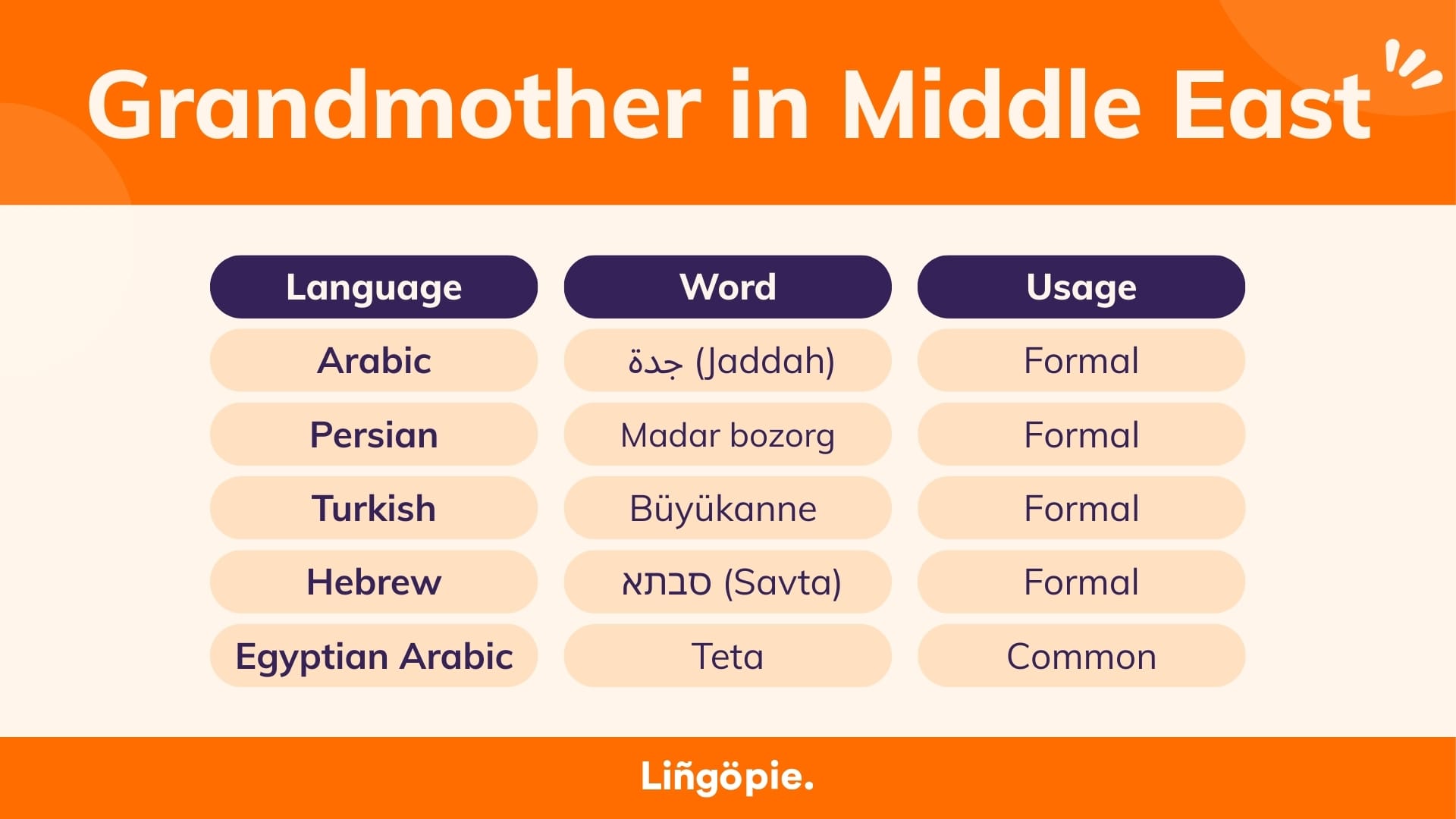
Grandmother In African Languages
African grandmother names tell us something fascinating about family structure - many languages name grandmothers based on their role as community leaders and wisdom keepers, not just their family position.
- Swahili: Bibi, Nyanya
- Yoruba: Ìyá Àgbà
- Zulu: uGogo
- Xhosa: uMakhulu
- Hausa: Kaka
- Amharic: አያት (Ayat)
- Igbo: Nne Nne
- Afrikaans: Ouma
- Somali: Ayeeyo
- Twi: Nana
- Lingala: Koko
- Wolof: Maam
- Kikuyu: Cucu
- Oromo: Akko
- Shona: Mbuya
In everyday Swahili, "Bibi" is all you need to know – it's short and sweet. Zulu speakers often drop the prefix and simply say "Gogo," while many urban families mix these traditional terms with English "Granny" or Portuguese "Avó," depending on the region.
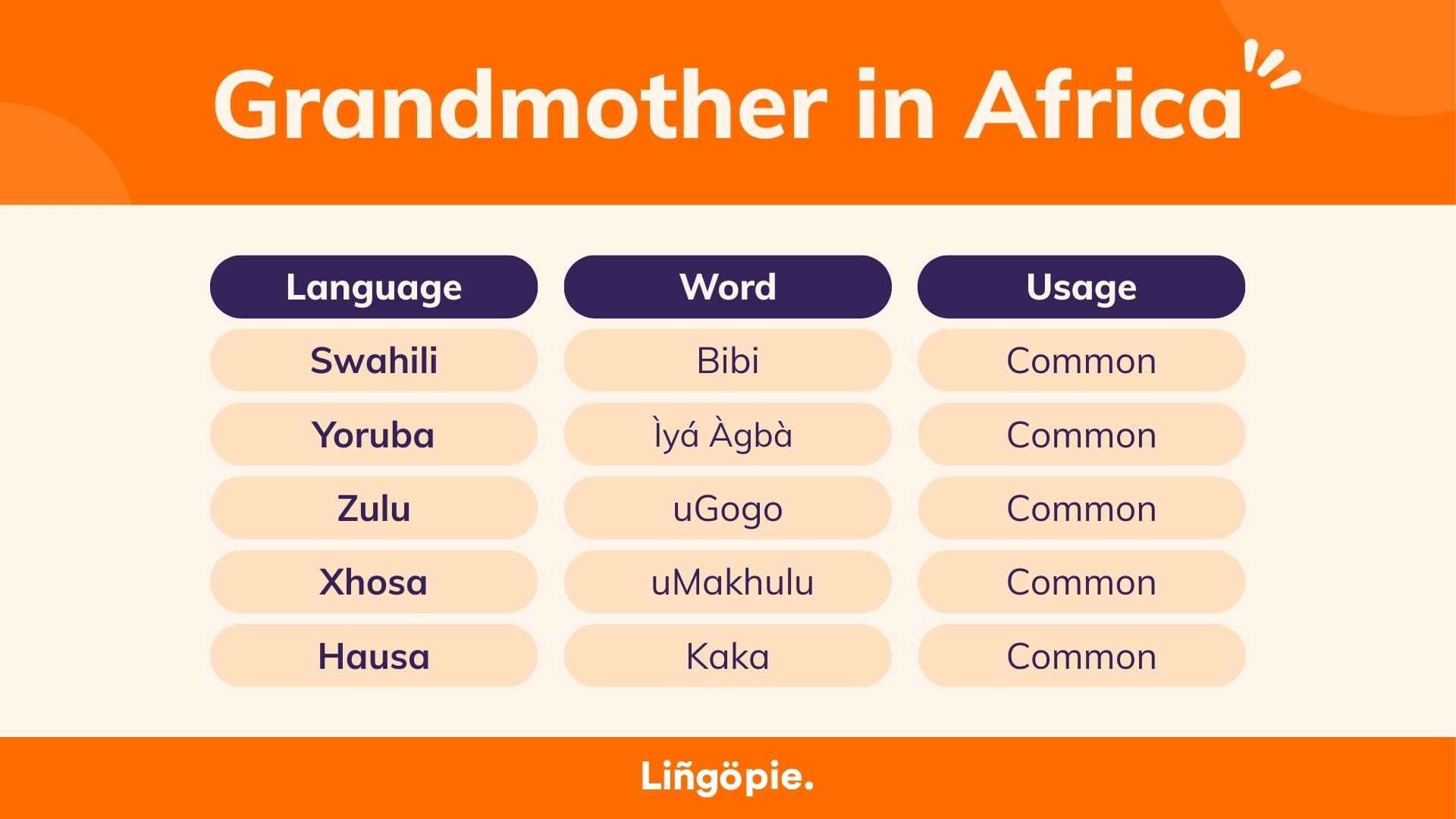
Modern Variations & Nicknames
These days, grandmothers aren't just sticking to traditional names. Modern families are getting creative with grandmother nicknames that reflect personality, cultural blends, and sometimes just what a toddler accidentally said first!
Common English Variations
- Traditional: Grandma, Granny, Gran
- Modern: Glamma, Gammy, Gigi
- Southern US: MawMaw, Meemaw, Grammy
- British: Nan, Nanny, Grannie
- Australian/NZ: Nan, Nanna, Gran
Trending Nicknames
- Fashion-forward: Glam-ma, Glammy
- Youth-inspired: G-Mom, Gran-Gran
- Personality-based: Queenie, Sugar, Cookie
- Accidentally adorable: Mimi, Pippy, Gaga
- Nature-inspired: Birdie, Sunny, Rose
Blended Family Variations
Modern families come in all shapes and sizes, and grandmother names have adapted to match. These days, it's less about formal titles and more about celebrating every special bond:
- Bonus Grandmas: Glamma, Bonus Gran, Extra Gran
- Step-grandmother: Gran-Plus, Second Gran
- Great-grandmother: GG, Super Gran, Grand-mama
- Multiple grandmothers: Gran [First Name], like "Gran Carol"
- Found family: Heart Gran, Chosen Gran
The best grandmother nicknames often come from toddlers trying to say traditional terms. "Gummy" or "Mimi" might not be what you planned, but these organic nicknames usually stick and become treasured family traditions.
Movies That Celebrate Grandmother's Love
Family movies often capture the special magic between grandmothers and their grandchildren, showing how this unique bond crosses all cultural boundaries. Here are four touching films that showcase grandmother love in different languages and cultures:
- Coco (Spanish/English) - A heartwarming tale where a Mexican grandmother's strict love eventually leads to family healing and understanding
- Moana (English/Polynesian) - Features a special relationship between Moana and her grandmother Tala, who guides her even after passing
- Mulan (Chinese/English) - Though brief, grandmother Fa's scenes steal the show with her lucky cricket and witty wisdom
- My Big Fat Greek Wedding (English/Greek) - The grandmother's traditional yet loving presence adds both humor and heart
Want to dive deeper into these languages and discover more stories about family bonds? Try Lingopie – where you can learn languages naturally through movies and shows just like these.
Learn A Language With Lingopie
Ready to watch family shows and learn a new language more deeply? Here's why Lingopie is your perfect learning companion:
- Learn family-related vocabulary naturally through authentic shows and movies
- Pick up local slang and everyday expressions you won't find in textbooks
- Discover how different cultures portray family relationships
- Practice with interactive subtitles and personalized flashcards
- Start with easy family conversations and build up to complex dialogues
Start your language journey with Lingopie today and surprise your grandmother (or Nonna, or Babushka, or 奶奶...) by speaking her native language. Our vast library of content means you're just one click away from immersing yourself in the languages that connect families worldwide.

Ready to bring your family closer through language? Start your 7-day FREE trial today and learn the way families really talk!


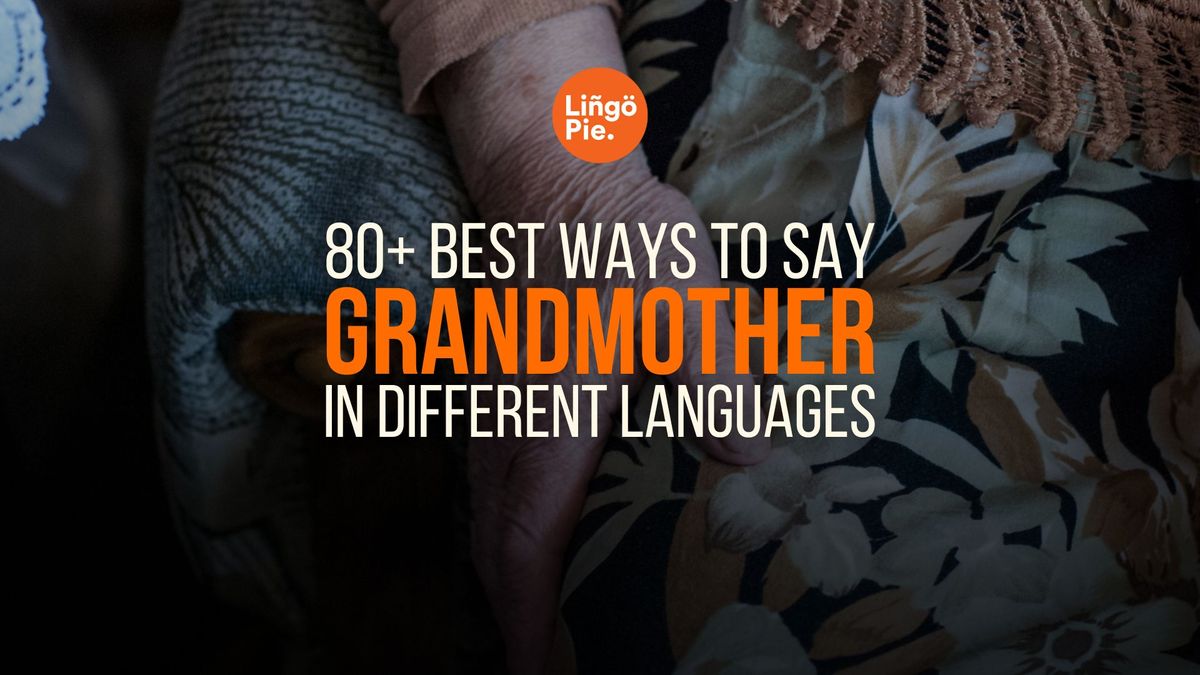


![How To Become Fluent in Spanish: 5 Best Tips [2026]](/blog/content/images/2023/10/444DE53E-3543-4F83-8DA7-E5BE31BAD1AA.png)


![How To Say Love In Different Languages [120+ Ways]](/blog/content/images/size/w300/2024/11/How-To-Say-Love-In-Different-Languages--120--Ways-.jpg)

